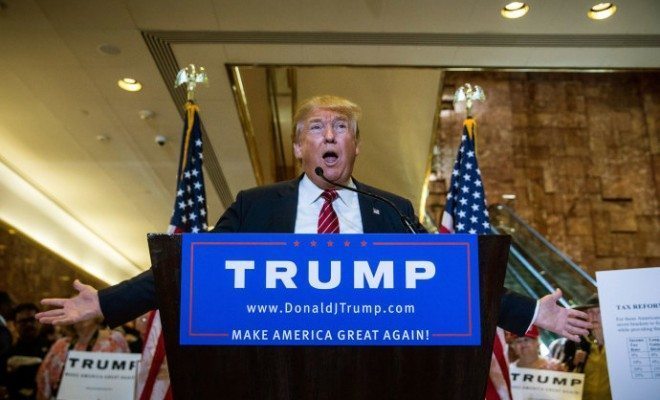 Image courtesy of [Peter Stevens via Flickr]
Image courtesy of [Peter Stevens via Flickr]
Elections
The Dangerous Rhetoric of Donald Trump
Charming to some. Smug to others. Abrasive to most. But even with such mixed feelings and emotional reactions invoked at the mention of his name, Donald Trump is leading the Republican polls. Most recently, Trump called for a temporary ban on Muslims entering the United States–which he further explained did not apply to U.S. citizens who were Muslim and would only last until the incompetent politicians on the hill can get themselves together. What that means is unclear, but it is evident from his interview with CNN’s Don Lemon that Trump, along with much of America, is not pleased with the lack of progress, law-making, and reform taking place in Washington, D.C.
Yes Mr. Trump, give yourself a pat on the back for creating a dialogue on an issue that is quite important and one that most Americans are less than educated about. However, you get points off for spreading extra bigotry. The American public needs to be wary of what Trump’s proposal actually means and the kind of law-making it reflects before we nod in agreement like the political pawns we are expected to be.
Apart from the blatant unconstitutional basis for this proposal, such a ban as the one proposed by Trump is problematic for a number of reasons. First and foremost, to ban a group of people from entering the United States on the basis of religion would be next to impossible in practice. There are approximately 1.6 billion Muslims in the world, equaling about 23 percent of the world’s population. These are 1.6 billion people coming from the Asian-Pacific region, the Middle East, Europe, Northern Africa as well as other African nations, just to name a few. These are people that do not share many physical characteristics and are not identifiable by a singular trait as they encompass anybody and everybody.
So how exactly would one prove he or she is not Muslim? Would people carry around affidavits sworn by their pastors? Would wearing a cross save you from categorical discrimination on the basis of religion? And what about the atheists of the world who practice no religion at all? How would they convince those around them that they are not Muslim? Additionally, do we really think ISIS members or other radical extremists would volunteer information about their practices to U.S. Customs Officers? These questions might sound absurd, but they are real and only highlight the ridiculousness of Trump’s proposal.
Secondly, there are a large number of Muslim businessmen and women, doctors, scientists, and academics that frequently travel to the United States and greatly contribute to the technological, educational, medical, economic, and scientific growth and advancement of the U.S.–areas of practice and study that have been decreasing in domestic educational interest for years. To ban them from entry into a country that they have been actively and positively contributing to would not only serve to offend them and turn them off from future engagements and endeavors, but it would be just plain stupid. Punishing Muslim innovators and educators due to the actions of a few–people whose behaviors they condemn and find absolutely reprehensible–is a waste of invaluable resources on an unfounded basis.
Thirdly, Trump’s ban is reminiscent of much darker times in history–i.e. when Jews were forced to wear badges identifying their faith under Adolf Hitler’s leadership and when Japanese-Americans were placed into internment camps following the attack on Pearl Harbor. One would assume that many lessons had been learned following the colossal tragedies that resulted out of such blatant and unfounded discrimination, but yet, with Trump’s rhetoric, it appears we have not. This Nazi-esque type of discrimination and exclusion based on religious beliefs has been condemned by parties on all sides and was even dubbed “un-American” by former Vice President Dick Cheney.
Finally, Trump seeks to confuse the issue at hand and puts the U.S. into an action-based response that is anticipated, wanted, and planned by extremist groups such as ISIS. The point of terrorism is to create terror, to stir up emotions of fear and irrational reactions used to isolate, alienate, and leave people vulnerable, open to great influence–exactly what the likes of ISIS would welcome, large groups of Muslim people feeling abandoned, isolated, and unwelcomed by the very societies they have set out to enrich, contribute positively to, and raise families in as model citizens. ISIS wants to build a “complete society” with men and women alike and they will recruit. Those vulnerable and rejected by Western societies are likely targets.
Trump’s rhetoric is dangerous two-fold. Not only does it seek to alienate and isolate Muslims from Western societies, leaving the doors open for ISIS recruitment, but it also works to confuse Islam with terrorism, dangerously perpetuating the idea that the two are interchangeable when they are absolutely not. Trump is promoting a display of Islamophobia that would be considered disgusting for anyone, much less a possible Republican Presidential candidate.








Comments